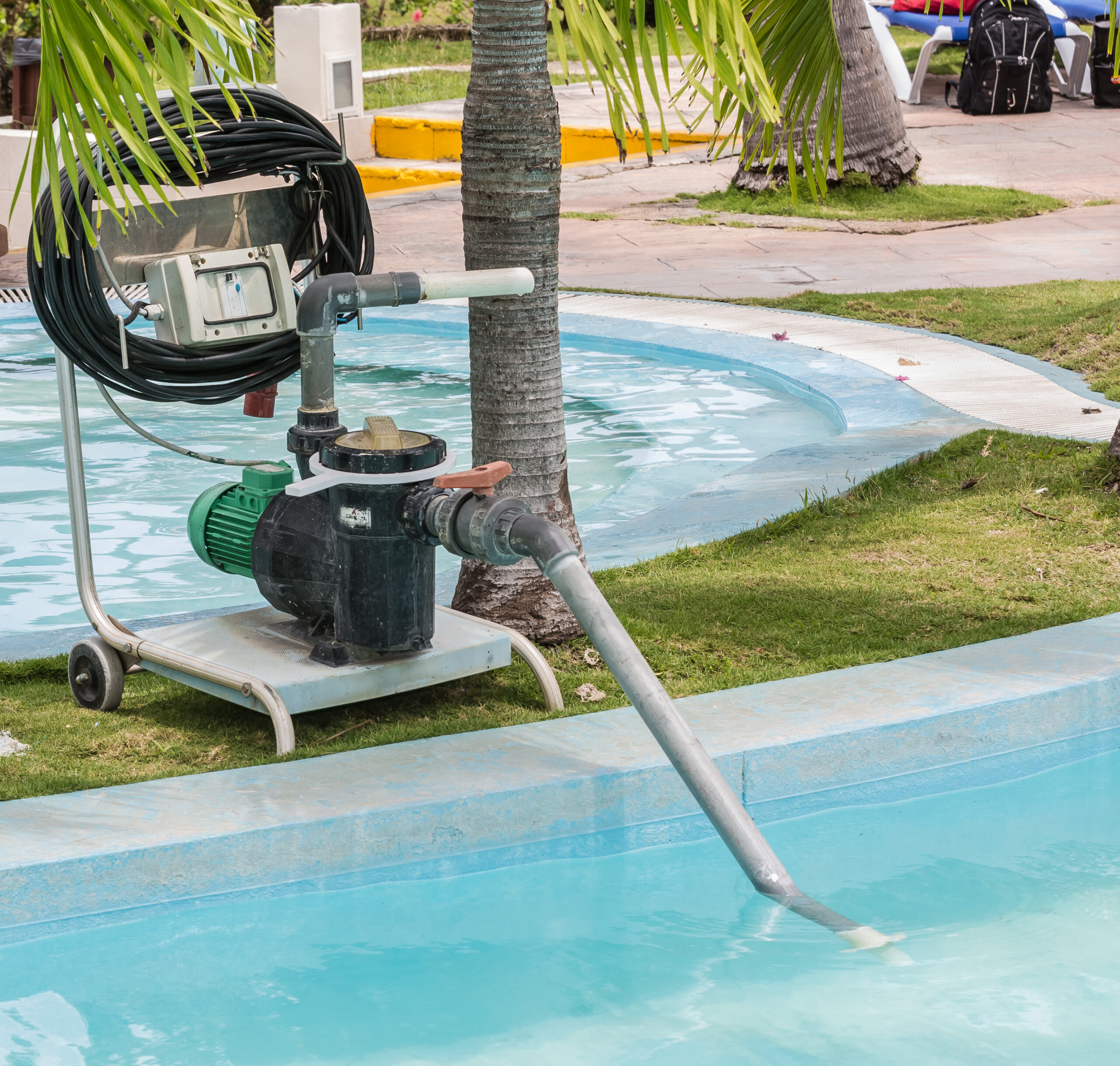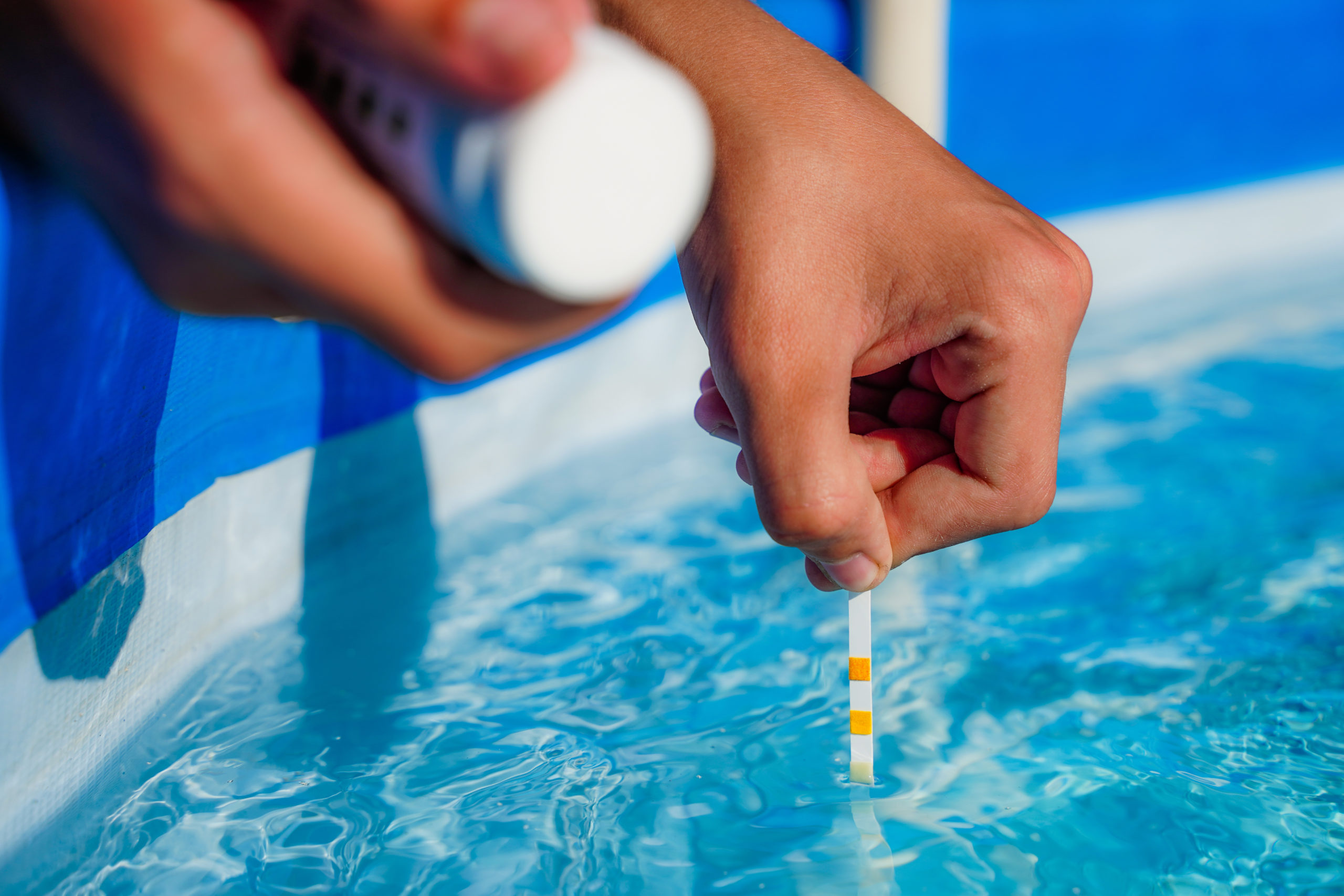You’ve got a new pool, and it’s exciting. But you’re also aware there’s work to do. Don’t fret! This guide simplifies the basics of pool maintenance for you.
By understanding your filtration system, mastering essential tools, performing regular water testing, managing chemicals safely, and applying effective cleaning techniques, you’ll be well on your way to maintaining a clean and healthy pool.
Let’s dive in!
Understanding Your Pool’s Filtration System
You’ve got to understand how your pool’s filtration system works if you’re going to keep it clean and safe. It is a complex yet crucial part of pool maintenance that requires attention and expertise.
In essence, the filtration system removes impurities from your pool, including debris, leaves, dirt, and even bacteria.

The key components are the pump, filter, and skimmers. The pump pulls water from the pool through the skimmers into the filter where unwanted particles are trapped. Filtration system upgrades can enhance this process by increasing efficiency or capacity.
Troubleshooting filtration issues begins with identifying common problems – inadequate water flow rate due to clogged filters or malfunctioning pumps; poor water quality arising from inefficient filters; excessive noise from the pump could indicate mechanical problems.
Regularly inspect these components for wear and tear. Be ready to replace damaged parts promptly as delays could compound problems leading to costly repairs or complete system replacement.
Essential Tools for Pool Maintenance
Before diving in, it’s crucial for you to understand which tools are essential for keeping your swimming area in top shape. The longevity of these tools is also worth investigating – hence, the Tool Durability Discussion.
For instance, a pool skimmer can last anywhere from 2-3 years with proper care and handling. It’s also advisable to invest in durable vacuum heads and hoses as they’re constantly exposed to pool chemicals.
Next comes the Maintenance Cost Analysis. Naturally, you’d want to keep your maintenance costs low while ensuring effective pool upkeep. A robust telescopic pole might seem pricey initially but proves cost-effective in the long run due to its durability compared to cheaper alternatives that need frequent replacements.
Also, don’t overlook the importance of a well-maintained filter system – remember our previous subtopic? Regular backwashing helps prolong its lifespan thus saving you replacement costs down the line.
The Importance of Regular Water Testing
It’s important to remember, regular water testing is crucial in maintaining a healthy and safe swimming environment. By conducting these tests, you’re ensuring the prevention of waterborne illnesses and keeping the pool chemical balance at an optimal level.
You may wonder why maintaining pool chemical balance is essential. It serves two primary roles: protecting your pool equipment from corrosion or scaling and safeguarding swimmers from harmful bacteria and algae. An imbalance can lead to murky water, skin irritation, or even more severe health issues like recreational water illnesses.
Your test should examine factors such as pH level, total alkalinity, calcium hardness, and chlorine content. These factors directly influence your pool’s susceptibility to bacterial growth and its overall clarity.
Ensuring a proper pH level between 7.2 – 7.6 allows for optimum chlorine disinfection, preventing the spread of waterborne illnesses. High pH levels lead to cloudy waters while extremely low ones cause eye irritation among swimmers.
Regularly monitoring these aspects not only guarantees clear sparkling water but also prolongs the life of your pool equipment by preventing unnecessary damage due to imbalances.

How to Manage Pool Chemicals Safely
Managing chemicals safely is crucial when ensuring the health of both your swimming pool environment and its users. You need to become proficient in Chemical Storage and using Protective Gear to handle these substances.
When it comes to Chemical Storage, you must ensure that the chemicals are stored separately from other materials, in a cool and dry place away from direct sunlight. The storage area should be ventilated properly and should be inaccessible for children or pets.
Using Protective Gear while handling these chemicals is a non-negotiable rule. It’s essential for you to always wear gloves, goggles, and a respirator mask. This will protect you from potential chemical burns, inhalation hazards, or eye damage.
Moreover, never mix different types of pool chemicals together as they can react violently with each other causing an explosion or toxic fumes.
Remember – safety is paramount when dealing with pool maintenance. By mastering these practices, not only will you ensure a healthy swimming environment but also protect yourself and others from potential hazards associated with improper chemical management.
Effective Techniques for Pool Cleaning and Upkeep
You’ve got to master effective techniques for keeping your swimming area pristine and well-maintained. One crucial element is implementing algae prevention strategies. Algae can be stubborn, but don’t let it deter you. Utilize a quality algicide regularly, maintain proper chemical balance, and ensure good water circulation.
Robotic cleaners offer numerous benefits in maintaining pool hygiene. They’re not just efficient; they’re also smart. These devices use advanced algorithms to map out the most effective cleaning route, ensuring every inch of your pool gets attention. Moreover, they tirelessly scrub away dirt and debris without requiring any effort from you.
However, remember that even with the best robotic cleaner on the market, manual brushing of pool walls shouldn’t be neglected completely. This helps dislodge stubborn spots that might resist an automatic cleaner’s touch.
Lastly, keep an eye on your filter system – regular backwashing helps keep it running optimally.
In mastering these techniques, you’ll uphold both the beauty and longevity of your swimming area. Pool maintenance might seem daunting initially but rest assured that with practice and diligence, it becomes second nature before long.
Frequently Asked Questions
What Types of Pool Covers Are Most Effective for Different Seasons?”
For seasonal effectiveness, you’ll want a durable winter cover for cold months. Mesh covers are great for spring and fall, while solar covers work best in summer due to their heat retention properties.
How Often Should I Replace the Pool Liner?”
You should replace your pool liner about every 5-9 years. Liner longevity depends on quality, installation process, and maintenance. Don’t wait for leaks; signs of wear mean it’s time to consider a new liner.
What Are the Benefits of Installing a Pool Heater?”
Installing a pool heater extends your swimming season, providing warm water when it’s cooler. Despite initial costs, heaters’ lifespan makes them a valuable investment for your comfort and the versatility of your pool usage.
How Can I Prevent Pool Equipment From Rusting or Deteriorating?”
To prevent pool equipment from rusting, you’ll need to employ proper equipment cleaning techniques and use corrosion resistant materials. Regular maintenance and inspection can also help identify early signs of deterioration.
What Are Some Ways to Improve the Energy Efficiency of My Pool?”
You can improve your pool’s energy efficiency by using efficient filtration systems and LED lighting. These changes reduce energy consumption, saving you money while maintaining a clean, well-lit swimming environment.
